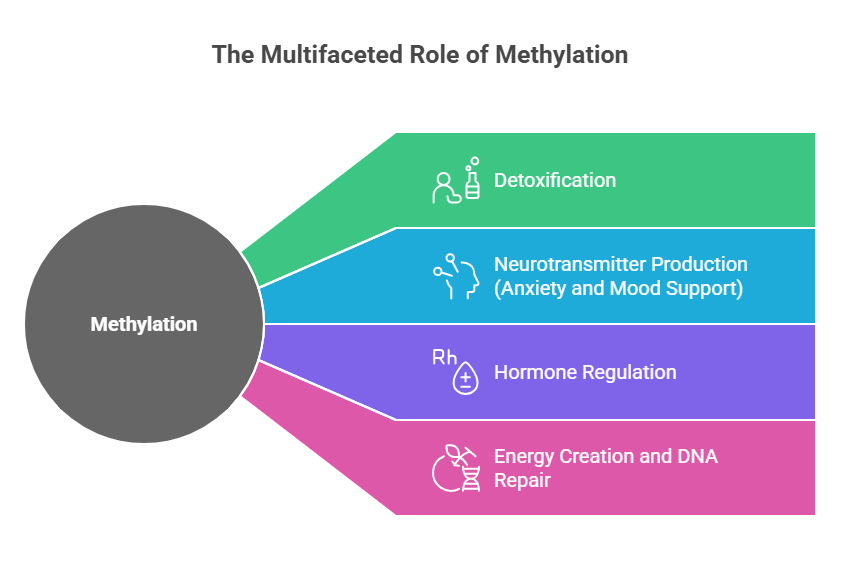Methylation, Mood, and Hormones: What Every Woman Needs to Know
Why it’s not just about MTHFR and what to do instead.
“I can’t tell you how much better I feel since I started taking methylated folic acid! My energy has improved and my mood is unbelievably better!” It’s just amazing!”
Let me tell you, I was as excited as my client when I heard this! I dove into genetic testing and MTHFR with abandonment. So many clients come to me struggling with mood concerns, fatigue and hormone issues. If testing this little gene and changing the source of folic acid could bring about these drastic improvements, I wanted all of my clients to experience it!
Except they didn’t all have the same response. Some saw sustainable improvement. Some improved temporarily and then regressed. Some felt worse almost immediately. And some didn’t notice anything when we addressed their MTHFR gene.
I’m convinced of the benefits of genetic testing to understand how nutrients interact in the body, but what was I missing with the popular MTHFR gene?
Finding Peace in the Middle of the Storm
If you’re anything like the women I work with, you’re probably carrying more than your fair share of weight right now.
Maybe you wake up tired, even after a full night’s sleep. You snap at your kids even though you love them dearly. You find yourself feeling anxious for no clear reason or struggling with heavy emotions that feel hard to explain.
And on top of it all, your hormones feel completely out of sync.
I want you to know you’re not alone, and you’re not broken.
I work with women just like you—women who are tired of feeling tired, anxious, irritable, and overlooked. And one thing I’ve found over and over again is this:
There’s a powerful process God designed in your body called methylation, and when it’s not working well, it can throw off everything from your mood to your hormones.
MTHFR is only one piece of the methylation puzzle. And contrary to what many assume, it is not the main piece of the puzzle.
Let me explain.
1. What Is Methylation and Why It Matters for Tired, Anxious Women
Think of methylation as one of the body's master multitaskers. It’s happening in every cell, every moment, behind the scenes.

Methylation helps your body:
- Detoxify chemicals and hormones
- Make neurotransmitters like serotonin, dopamine, and norepinephrine (which affect your mood)
- Regulate estrogen levels
- Create energy and repair DNA
When methylation isn’t working properly, you may notice:
- Anxiety or panic
- Irritability or mood swings
- Fatigue—even after rest
- Hormone imbalances (PMS, heavy periods, irregular cycles)
- Trouble focusing
Here’s the good news: these aren’t signs of weakness—they’re signs that your body is asking for help. You don’t need to force your way through with more willpower. Instead, you can support this beautiful process God designed.
2. Why MTHFR Isn’t the Whole Story (and Might Be Misleading)
If you’ve ever had genetic testing or been part of a natural health group, you’ve probably heard about MTHFR. It’s a gene that influences how your body uses folate—a B vitamin involved in methylation.
Some women are told, “You have the MTHFR mutation—you need methylated B vitamins!” But here’s the thing I am learning:
Just because you have the gene doesn’t mean the gene is expressing.
And just because the gene expresses itself doesn't mean you need methylated supplements.
In fact, I’ve seen women feel worse after starting high doses of methylated B12 or folate based only on this gene. Why? Because MTHFR is just one enzyme in a whole network. It doesn’t tell you whether your methylation is actually working—or not.
3. A Better Way: Testing Overall Methylation Function Instead of MTHFR
If we really want to understand how your methylation is working, there’s an easy blood test that helps you know if you are an under- or over-methylator.
Undermethylators often feel anxious, perfectionistic, and driven—but struggle with serotonin levels and sleep.
Overmethylators might feel spacey, overwhelmed, and emotionally reactive, often sensitive to supplements and medications.
Knowing whether you’re an under- or over-methylator helps us know how to support your mood, hormones, and energy—without guesswork. It also helps determine whether methylated vitamins will help or hurt.
This kind of clarity can be life changing.
That is why I offer methylation testing to my clients inside the Wholeness Restored Program. Many women are taking methylated B-vitamins without knowing if it is helping or hindering their healing process. I want women to stop guessing and have the answers they need to make informed decisions about their health.
Wrapping It Up: The Path Forward
If you’re worn down from trying to hold it all together—please hear me: you are not failing. Your body may just need a different kind of support.
God made your body wise and resilient. Methylation is one of the many systems He placed in you to help you thrive—even in seasons of stress. The more we learn to listen to the signs He built into our biology, the more quickly we can begin to heal.
You don’t need another supplement guess. You need clarity. And you need a plan that honors your body and your life as a woman with limited margin.
Let’s Take the Next Step Together
If you’re ready to stop feeling anxious, irritable, and out of balance… and you want help that’s both scientific and personable, I’d love to walk with you.
Click here to schedule a free clarity call.
We’ll chat about your story, your health concerns, and whether methylation testing might be a good next step.
You don’t have to walk this healing journey alone. Let’s uncover what your body’s been trying to tell you—and respond with nurturing, not guessing.











